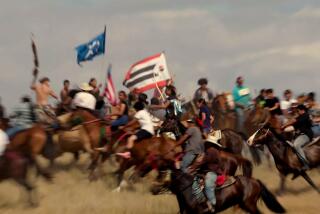TV REVIEW : ‘Range’ Pits Islanders Against U.S.
- Share via
In its quiet, unassuming way, “Home on the Range” (airing at 11 tonight on KCET Channel 28) tells a devastating story. It takes place mostly on the Marshall Islands’ Kwajalein Atoll--now a testing facility for ICBM and “Star Wars” programs--and neighboring Ebeye, an overcrowded, 66-acre island on which Kwajalein’s previous occupants were “repopulated” decades ago.
What we see are the consequences when Kwajalein’s rightful owners, under a feisty and almost irresistibly likable old chief, Handel Dribo (speeches read by James Whitmore), try to reclaim their land from the United States after the lease expires.
Their seizure, of course, seems symbolic. The owners, who supposedly receive $9 million a year in rent, are protesting Ebeye’s squalid conditions--but the U.S. government, represented by two stony-faced bureaucrats, is in no mood to capitulate. Reagan Administration-mandated budget cuts have made renegotiation of the lease impossible; anyway, the island must continue as a bomb target (and its lagoon, since the film was shot, as a huge garbage landfill).
The title “Home on the Range” implies a connection with the classic American movie Western, and there is one: the old story of rich and mighty riding roughshod over the poor on the open range. Halfway through, we discover that Chief Dribo once ran a movie house and that his all-time favorite actor was John Wayne--”I loved to watch his quick draw--and he was always great in his acting!” Yet Duke never shows up here to champion the settlers’ rights. Neither does Gary Cooper, Jimmy Stewart or Shane. It’s a pity--but the climax is exactly what we’d expect, almost anywhere but in a movie.
Though “Home on the Range” is an engaged documentary, director Adam Horowitz keeps his voice muted, careful, alive to the irony of the situation. The chief stands up for every value and ideal America supposedly represents and encourages--including getting more rent from his tenants--against a government that obviously couldn’t care less. At the end, he tells us, sadly: “I don’t understand the Americans, because they seem to the best people in the world; yet they are also the worst people in the world.”
Watching this documentary, and seeing the rationalizations and stratagems of men who supposedly represent us, it’s hard to disagree.
More to Read
The complete guide to home viewing
Get Screen Gab for everything about the TV shows and streaming movies everyone’s talking about.
You may occasionally receive promotional content from the Los Angeles Times.






